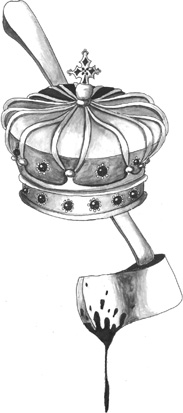
AS I was going by Charing Cross
I saw a black man upon a black horse;
They told me it was King Charles the First,
Oh dear, my heart was ready to burst.
This rhyme (with its echo of Ride a Cock Horse to Banbury Cross) refers to the public execution of King Charles I on 30 January 1649 outside the palace of Whitehall, very close to Charing Cross. Following his capture and imprisonment by the Parliamentarians towards the end of the Civil War, Charles presented a huge problem to his captors. Alive, he posed a constant threat to their new state; dead, he would instantly become a hero. Eventually and reluctantly, they brought him to trial.
The lack of public support for the trial was painfully obvious, despite the harsh wording of the charge brought against him: ‘Out of a wicked design to erect and uphold himself with an unlimited and tyrannical power to rule according to his own will and to overthrow the rights and the liberties of the people of England.’ Showing the same arrogance that had brought on the Civil War, Charles refused even to answer the charge, believing that his own authority to rule had been given to him by God when he had been crowned and anointed, while the power wielded by those wishing to try him was simply that which grew out of a barrel of gunpowder. The court argued that no man was above the law, but when the king was duly found guilty, Richard Brandon, Hangman of London, summed up the general mood by refusing to carry out the task.

Eventually a man was paid £100, a ridiculous amount of money for the time, to act as executioner, but he insisted on remaining anonymous.
The killing of a king was hugely contentious, and the murder of the man divinely chosen to rule made the perfect ghoulish subject for a nursery rhyme. Although the execution was watched by thousands, including the famous diarist Samuel Pepys, few accounts of it survive to this day. It was common practice for the head of a person convicted of treason to be held up, following their decapitation, and shown to the crowd with the words: ‘Behold the head of a traitor!’ When Charles’s head was exhibited, the words were not used, and unlike the carnival atmosphere at any normal execution, the mood of the crowd was sombre. Hearts really were ready to burst. Various strange phenomena were later recorded in relation to the execution: a beached whale at Dover died within an hour of Charles himself; a falling star appeared that night over Whitehall; and a man who had said the king deserved to die had his eyes pecked out by crows, or so it was said.